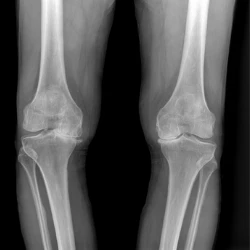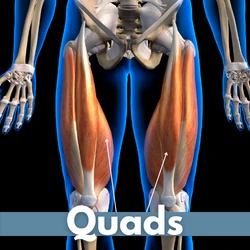
While some popping and clicking (or crepitus) in the knee is common, if the noises are accompanied with pain, it's time to see an Orthopedic Specialist. There are a variety of options you can pursue to deal with your knee pain, but consulting with a specialist is always the best option for personalized care that meets your goals.
In this article, we have asked Dr. Matthew Robinson, OrthoCarolina fellowship trained Hip & Knee Surgeon, to share with us the non-surgical options available for patients with knee arthritis.
Nonsurgical Treatment Options for Knee Osteoarthritis

Knee pain is one of the most common complaints seen by orthopedic surgeons. It is important to determine the cause of pain with a full history, physical exam, and x-rays. If the pain is determined to be from wear-and-tear degenerative osteoarthritis, there are a number of nonsurgical treatments that can be helpful to minimize pain and maximize function. Here are a few:
Activity Modification
Do your best to avoid common activities or irritants that increase knee arthritis pain and inflammation like:
- Stairs,
- Hills,
- Uneven terrain,
- Squats,
- Other activities
Medications
- Oral anti-inflammatory pain medication (NSAIDs) in the ibuprofen family are strongly recommended for pain and inflammation if able to take. Oral acetaminophen/Tylenol is another option, especially when NSAIDs are contraindicated.
- Oral supplements (turmeric, ginger, glucosamine, chondroitin, Vitamin D) may be helpful in mild to moderate knee arthritis. They have little downside, but the evidence for their effectiveness is limited.
- Topical NSAIDs (like over the counter topical diclofenac) can be helpful to improve function and quality of life.
Learn more about OrthoCarolina's commitment to reducing the opioid epidemic here.
Injections
Knee joint injections can be helpful in certain circumstances. Cortisone/steroids can provide short-term pain relief. Hyaluronic acid, platelet-rich plasma, and stem cell injections have limited yet evidence in painful knee arthritis, however additional research continues. As always we recommend discussing options based on your personal health history with your orthopedic specialist.
Learn more about Orthobiologics here.
Exercise

Physical therapy or a self-directed home exercise program (focused on quadriceps muscle strengthening and gait/walking) can help with pain and knee function. Aquatic exercise is another low-impact activity that can be helpful. Other recommended low impact activities include stationary bike and the elliptical.
For more guidance on activity modifications suitable for arthritis patients, click here.
Devices
A knee brace or sleeve can be used to help with function, pain, and quality of life, especially in situations when the knee is giving out or buckling. A cane or walker can be helpful to improve pain, prevent falls, and help with walking. A cane is typically used in the hand opposite the painful knee.
Gravity and your Joints
Weight loss could reduce forces across the knee and improve knee pain and function where applicable. Your orthopedic specialist can best help navigate all specifics of your care and pain management with options best for your lifestyle, health history, and needs.
When should I seek help from an orthopedic specialist for your knee pain?
When the pain is significant enough on a daily basis and function getting around is limited, surgery can be an option. However, it is important to talk to your doctor about the nonsurgical options that may be helpful to improve your knee pain and function.
This information is provided as an educational service and is not intended to serve as medical advice. If you are seeking specific orthopedic advice or assistance, please consult with your OrthoCarolina physician or locate one in your area through OrthoCarolina’s website at www.OrthoCarolina.com.
Back




September 03, 2022
September 06, 2022